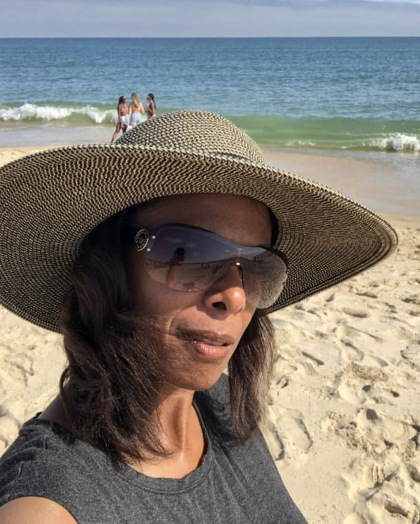Perspectives: Affirmative Distraction
Written By: Chimene Liburd, MD, MBA, FACP
Dr. Liburd MD, MBA, FACP, CPE, CPC is a physician executive with multifaceted expertise in healthcare management, inpatient and outpatient primary care, chronic condition management, healthcare improvement initiatives, and patient health and wellness. She works with Avestria a VC firm which invests in women’s health and female-led life science ventures.
Chimene on Katama Beach/ South Beach (Summer 2023)
We are in strange times. It feels like I am traveling back to the past with no hope of returning to any semblance of “normalcy.”
I am a fifty-two, almost fifty-three-year-old black woman, and a child of the’70s. I come from a family that had to struggle to survive in these United States. Like many of my peers, classmates, friends, and family, I question the recent Supreme Court affirmative action ruling. What impact will it have on my children or their children? Is it not evident that affirmative action directly impacts all Americans, not just African Americans? How do we not repeat our past if we don’t understand and study our history?
I am a product of affirmative action. I acknowledge that I was given opportunities because of my race and gender. However, it was up to me to excel and succeed once those opportunities were presented. Interestingly, in high school, a guidance counselor told me I wouldn’t get into the schools I applied to and to apply to “safer” schools in Queens. I never fully understood her comments 35 years ago, but it makes perfect sense today because those sentiments still exist in 2023.
I was afforded the opportunity to get an education at an Ivy League institution. My experience at Cornell University shaped who I am, from the pre-freshman summer program, to being a life member of the Cornell Black Alumni Association (CBAA), and a sustaining member of the President's Council of Cornell Women (PCCW). In spite of the sentiments of my guidance counselor and countless others like her, many individuals and organizations throughout history have worked tirelessly to challenge systemic barriers and fight for social justice and equality.
The exposure to Africana Studies courses with Professors like James Turner and Anne Adams opened my eyes to the struggles of black people in the United States and throughout the diaspora. I was in awe of the rich literature that we created to document our lived experiences, or to simply entertain and enlighten ourselves. But it wasn’t until I became an adult with children that I could reflect on my ancestors' impact on my success and all I had achieved. They opened doors so I could graduate from Cornell and study medicine.
While the current Supreme Court ruling strikes down affirmative action in higher education, we must also be vigilant and vocal about its impact in the workplace. We as a collective should understand that diversity of experience, thought, education, age, gender, and race all positively impact our society. America needs to strive toward more inclusivity and less exclusivity, as studies show how companies with diverse leadership and board directors financially outperform less diverse companies.
The Fight For Our Children's Futures In These Times Of Discord
Affirmative action is a policy that seeks to address historical and ongoing discrimination by providing opportunities to historically marginalized groups, including Black people who have the necessary qualifications for a job or a university class. African American students will need to be deliberate in their choice of an institution in the coming years. The selection of a college should be a place where you can access a broad curriculum to experience different fields of study. However, students should evaluate a school's diversity and the support system at the university for black and brown students. Students should also look at the 107 HBCUs across the country, as they are a great choice with a diverse student body and a broad curriculum where many students flourish and grow.
This year has demonstrated the need for Black alumni of predominantly white institutions to be engaged and vocal at their alma maters. Parents of college-bound black students must help their children navigate the challenges of a complicated admissions process. Leaders at universities should foster a more inclusive and diverse campus through an intentional and thoughtful admissions process. Opening doors and creating opportunities for black students must be deliberate, as they have far more obstacles placed in front of them. Remove those systemic obstacles, and when the playing field is level, and everyone wins.

